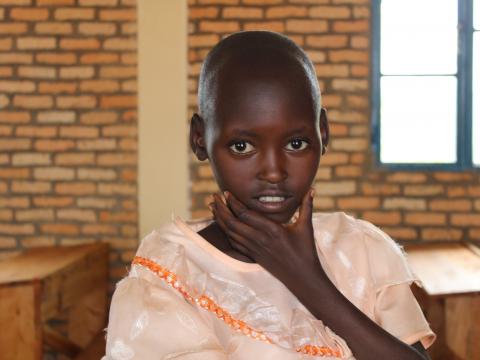Voices of Orphan children in Burundi.

Alvera, a Grade 3 school girl, is an orphan with two siblings. Her mum fell prey to the war, and more recently, tuberculosis took away her father. She and her younger brother are in the care of their grandmother now, who took them in despite finding it already difficult to fend for herself due to old age. She was unable to take care of all the orphans and Alvera’s elder brother was taken in by an orphanage run by Catholic nuns in the neighbouring province of Ruyigi, around 30 km away.
“Their grandmother is too old to be able to take care of all of them. Even younger people have to work very hard to find enough to feed their kids.” says Rose Nizeyimana, one of Alvera’s neighbours. She, also, took in two orphans despite having a large family, and four children of her own.
“It is not easy, but we need to help,” she continues, smiling under her bright orange headscarf. “There is just not enough land to feed everyone,” she says. Even the land they have is not as productive as it used to be and that makes life difficult for everyone, including children.
Though primary school is free and parents want to send their children to school – partly also because of World Vision’s activities in the area, stressing the importance of education – schools are sparse. As her local school was small and overcrowded, up until September, Alvera had to walk six hours to and back from school. Despite the long, strenuous walk she only spent two hours in the school. Concerned about her safety and not wanting her to walk back home late in the evening, the teacher would send her home early afternoon.
When asked what she used to think about during her long journey, Alvera says simply, “I used to be afraid. I was physically in class but my mind was outside, thinking about my long way back. I had to cross a river on the way back; it had two logs as bridge, and when it rained, it was difficult to cross it. It was hard but both myself and my old grandmother were convinced that I had to go to school.”
During difficult times, vulnerable children are most affected. Mames Nizigiyimana, a 10-year-old student, and peer of Alvera, says that before going to school he has breakfast; eats beans or bananas, and has energy for the school. But he is aware, he says, that not all the children are as fortunate as him.
There has been a ray of hope for children like Alvera. They no longer have to walk in difficult conditions just to be able to get an education. A new school with six brand new classrooms stays tall on the top of the hill thanks to World Vision’s work in the area. World Vision is most concerned about children like Alvera and works with their caregivers and communities to ensure they can live a life of dignity, and can overcome the difficult marks left by Burundi’s heavy past.